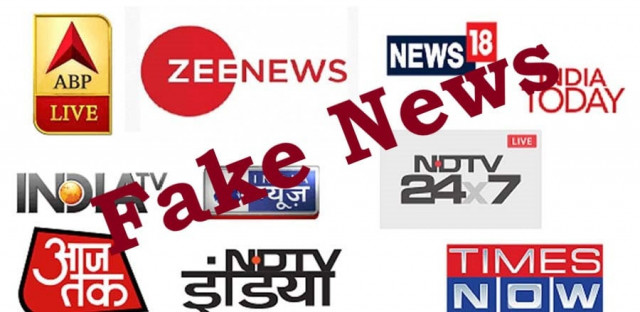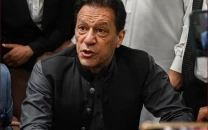From plane hijacking to Mumbai, Pulwama attacks: Falsehood remains India’s statecraft
Indian establishment articulately cultivates anti-Pakistan narrative to distract media from domestic challenges

Be it an incident of plane hijacking, attacks on the Indian parliament, Mumbai or Pulwama or Uri, India always used falsehood as statecraft to malign Pakistan, make political gains and above all divert focus from economic meltdown, insurgencies and religious bigotry at home.
The Indian establishment articulately constructs and cultivates anti-Pakistan narrative to distract the attention of international and local media from serious domestic challenges, including widespread demonstrations and tensions between ethnic groups.
From the alleged disintegration of Pakistan to its enlisting on the FATF grey list, the Indian political and intelligence leadership has always claimed to have played their role, which was based on fake propaganda and disinformation campaigns.
The drama of the Indian Parliament attack in 2001 was not the first time New Delhi had used a false flag operation to execute its hidden agenda against Pakistan.
The Indian blatant propaganda was badly exposed when The Wire news agency disclosed WhatsApp chats between Indian anchorperson Arnab Goswami, and former CEO of the rating agency Broadcast Audience Research Council (BARC) Partho Dasgupta.
The chats exposed the sinister designs hatched by Modi’s government to blame Pakistan for the false Pulwama attack, followed by a botched air strike on Balakot in February 2019.
India always tried to bluff the international stakeholders and community to project Pakistan as a state that sponsored terrorism.
Exposing the nexus between the ruling BJP and extremist group Rashtriya Swayamsevak Sangh (RSS), the ex-Indian home minister Sushil Kumar Shinde revealed in 2013 that they were behind the Samjhauta Express, Mecca Masjid and Malegaon blasts.
The boat drama orchestrated by the Indian intelligence agencies prior to then US president Barack Obama’s second visit to India was also proven to be false when their own top officials admitted that there was no such boat that came from Pakistan.
India uses false flag operations to generate a negative perception to initiate international actions against Pakistan as well as a tool of coercion, which is often utilised to provoke or justify a war against adversaries.
Read India Modi's personal Twitter handle 'briefly compromised' -Prime Minister's Office
In an interview, Major General (retd) Z A Khan, former director, DGFI (Bangladeshi Intelligence) said “There is no doubt that RAW played a vital role during our liberation war, but their motive was to divide Pakistan at any cost to weaken their archrival.”
Former Indian premier Indira Gandhi had also revealed after the fall of Dhaka that “we [India] have taken the revenge of a thousand years.”
Incumbent Indian Prime Minister Narendra Modi in his speech, during his visit to Bangladesh to receive the War of Liberation Award on behalf of the former premier Atal Bihari Vajpayee, on 7th June 2015, said that “we fought for Bangladesh’s ‘swabhimaan’ (honour) alongside Mukti Jodhas (Mukti Bahini) for Bangladesh. Indians were fighting side-by-side with them and in a way helped realise the dream of Bangladesh.”
Moreover, India's spy agency plotted a false flag operation on 30th January 1971 when an Indian airplane was hijacked and flown to Lahore airport, and Pakistan was immediately blamed and was prohibited to use Indian airspace to the then East Pakistan.
Later, it was revealed that the plane was already out of service but was made operational only a day before the incident of hijacking was staged.
In 1999, an Indian airlines airbus flying from Kathmandu to New Delhi was also hijacked just before the planned visit of then US president Bill Clinton to Pakistan and India.
Read more India’s attempt to get back into Afghanistan
After the refusal to land in Dubai, Amritsar, and Lahore, the plane landed at Kandahar Airport, which was under the command of the Taliban. It was reported that the hijackers demanded to release captive militants, which were Pakistani nationals, but Indian government had failed to furnish any evidence of Pakistan’s involvement.
The Indian propaganda of blaming Pakistan after the mass killing of 35 Sikhs in the Chittisinghpura Massacre in 2000, the Indian Parliament Attack in 2001, car bombing at the occupied Kashmir's Legislative Assembly in 2001, and the Malegaon Mosque Blast in 2006 were also found to be false by India’s own officials.
Similarly, an RSS militant Kamal Chauhan was arrested for carrying out the Samjhauta Express attack in 2007 who had instead blamed the Muslim groups. Chauhan and other activists were also found to be involved in the Ajmer Dargah blast, Hyderabad’s Mecca Masjid, as well as the Malegaon Mosque Blast.
Several political commentators had also called it “Hindutva Terror” or the “Saffron Terror”.
The chief of the Mumbai Anti-Terrorist Squad Hemant Karkare, who was probing the attack and had exposed the RSS involvement, was later targeted and killed during the Mumbai 2008 operation.
The Indian government had once again blamed Pakistan for the incident but Islamabad had instead condemned the attack and offered help in the investigation process.
It is pertinent to note that German author Davidsson’s book titled 'The Betrayal of India: Revisiting the 26/11 Evidence' had also verified that the Mumbai attack was a false flag operation by Indian, US, and Israeli intelligence nexus to malign Pakistan.
Also read ‘India has highest number of journalists murdered for their work’
The attack on the Sri Lankan Cricket team in Lahore was also found to be carried out with the involvement of Indian agencies to blame Pakistan for terror. But the Sri Lankan Police Chief Mendis categorically rejected this country's involvement and reported that this act of terror was carried out by India to malign Pakistan.
After Modi’s visit to former PM Nawaz Sharif at his residence and the desire for better bilateral ties, the Pathankot Air Base Attack took place in 2016 for which Pakistan and Jaish-e-Muhammad (JeM) were blamed. But the director-general of the National Investigation Agency had reported after the investigation that they didn’t find any direct involvement of Pakistani agencies.
In 2019, the Indian Air Force (IAF) launched an aerial strike near ‘Balakot’ targeting a religious seminary that India described as a militant camp and claimed killing more than 300 terrorists, but without sharing any supporting evidence that could otherwise corroborate the claims.
In response, Pakistan Air Force (PAF) managed to shoot down two IAF aircraft and captured one of the pilots. India claimed to have killed 300 terrorists while Pakistan and several international observers negated the claim as there were no casualties. India also claimed that one of its Mig-21s had shot down Pakistan’s F-16 aircraft, which was also refuted by an influential foreign policy magazine.
Similarly, the Indian strategy in Afghanistan was based on targeting the Afghan Taliban and cultivating the Afghan government at Kabul with a view to creating a permanent wedge between the two.
Read India's Haryana bars Muslims from offering prayers in open spaces
Since New Delhi could not openly challenge the Afghan Peace Process, they ramped up their subversion efforts to derail the peace process by arming the Afghan National Forces to the teeth and encouraging them to attack the Taliban with renewed vigour.
It must be noted that as per the 26th UN report on terrorism released in July 2020, “significant numbers” of ISIS and IS-K terrorists are situated in two states of India - Kerala and Karnataka.
An investigation by the EU Dis-info Lab to expose India’s 15-year propaganda operation targeting the UN and EU to malign Pakistan was the newest revelation of a fake campaign run by an Indian organisation called the Srivastava Group.
This systematic disinformation campaign was designed to influence the members of the EU parliament, international opinion-makers and decision-makers.
India is known to have a loose and undisciplined military culture, and Indian troops often do not follow standard operating procedures and regulations.
The helicopter crash of Indian Chief of Defence Staff Bipin Rawat is being termed a consequence of the poorly trained and equipped Indian armed forces.



















COMMENTS
Comments are moderated and generally will be posted if they are on-topic and not abusive.
For more information, please see our Comments FAQ